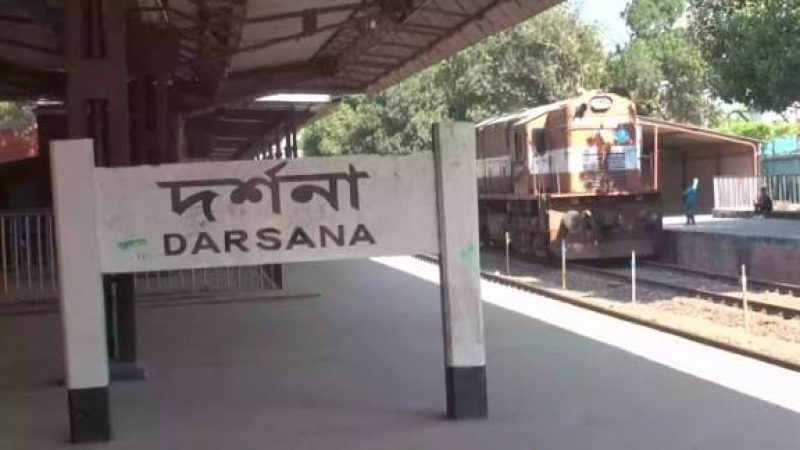- Dhaka’s Per Capita Income Rises to USD 5,163 |
- DSE turnover dips 18% despite weekly gains in key indices |
- 65 Nations Sign UN Treaty to Combat Cybercrime Globally |
- Dhaka’s air quality ‘unhealthy’ 5th worst in world Saturday |
- Dhaka’s air recorded unhealthy on Friday morning |
Darshana Station Silent as Cross-Border Trade Halts

Darshana Railway Station, once the heartbeat of Chuadanga’s trade, now stands silent and deserted as cross-border imports collapse, affecting revenue collection and leaving countless workers jobless.
The decline has been dramatic as official figures show the station earned Tk 26.94 crore in revenue in the 2023-24 fiscal year. So far this fiscal year, the figure has dropped to only Tk 11.40 crore, a fall of nearly 60 per cent.
Until recently, trains laden with imported goods such as corn, stone, onions, China clay, and gypsum and soybean meal would arrive daily, keeping hundreds of labourers, truckers and clearing agents engaged.
Now, the scene has changed completely as only a handful of freight wagons carrying fly ash arrive occasionally, and even those are often unloaded elsewhere.
Darshana was once the preferred entry point for traders due to its lower costs and strong logistical support. But the combination of complexities in opening letters of credit (LCs), a dollar shortage and uncertainty following the recent change in government has slowed imports to a crawl.
As a result, 9,749 freight wagons brought in 576,559 metric tonnes of goods from India during the last fiscal year. This year, the number has fallen to 4,486 wagons carrying only 252,101 tonnes, less than half the previous volume, officials said.
They said the slowdown has taken a devastating toll on those who depend on the yard for their livelihoods. Hundreds of transport workers and manual labourers have been rendered jobless. Some have switched professions, while many have migrated to other districts in search of work.
“It feels like the Covid-19 days again. We sit idle all day because no trains come,” said yard labourer Saidul Islam, struggling to feed his family.
Trucker Titu Mia echoed the sentiment. “Before, I could make two or three trips a day. Now, I hardly manage one trip in three days.”
Truck owners say their vehicles remain idle for weeks, causing financial losses and mechanical deterioration. “We’re incurring losses every month. Many trucks are simply parked as there’s no business,” said one owner.
Customs agents and traders attribute the decline mainly to difficulties in LC processing and rising costs. They say banks now demand full cash deposits before approving LCs, a sharp contrast to earlier when partial payments sufficed.
“If the LC process is simplified, business will normalise again,” said Rafiqul Islam, a clearing and forwarding (C&F) agent at Darshana.
Trader Rana Khan lamented that their investments have been reduced to idle assets. “Our capital, trucks, and workforce are all sitting unused because imports have nearly stopped,” he said.
Some workers, unwilling to be named, said the yard had begun recovering after the pandemic but fell back into crisis due to recent political disruptions. “We just want stability so we can return to work,” one worker said.
Officials remain cautiously optimistic that the situation will improve once political and financial stability returns.
“Revenue has dropped drastically this year as business slowed due to lower imports from India,” said Mirza Kamrul Haque, superintendent of Darshana International Railway Station. “We’re hopeful that import volumes will grow again when the situation improves.”
The Chuadanga Chamber of Commerce and Industry echoed this sentiment, identifying LC complications and political instability as key barriers to revival. “Until things return to normal, the yard will remain sluggish and traders will continue to suffer,” said Shaharine Haque Malik, senior vice president of the chamber.
For now, Kamrul Haque said, the sound of shunting trains and bustling labourers that once defined Darshana has been replaced by silence, a stark reminder of how quickly economic uncertainty can derail livelihoods, reports UNB.

